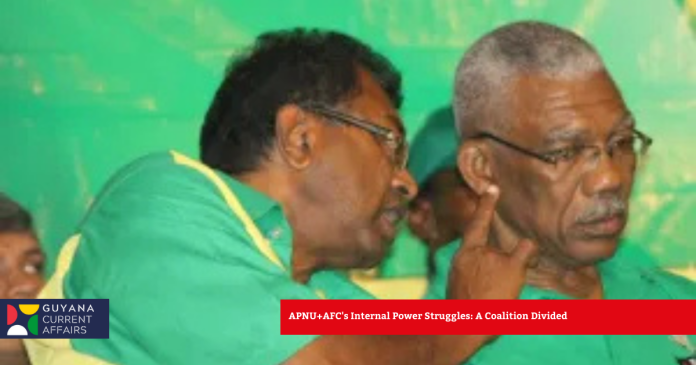The once-formidable APNU+AFC coalition is facing significant internal turmoil as it attempts to reunite for the upcoming 2025 elections in Guyana. Recent developments have exposed deep-seated tensions and power struggles within the alliance, threatening to undermine their efforts to present a united front against the ruling PPP/C government.
Leadership Disputes
At the heart of the coalition’s troubles lies a contentious battle for leadership:
- Presidential Candidacy: APNU leader Aubrey Norton and AFC leader Nigel Hughes are both vying for the top position. Norton has consistently maintained that the PNC/R, as the largest party in the coalition, is entitled to the presidential candidacy. However, Hughes firmly stated “Absolutely not” when asked if Norton had been identified as the presidential candidate.
- AFC’s Position: The AFC has unanimously appointed Hughes as their presidential candidate. This move has created friction with APNU, as it challenges Norton’s claim to leadership.
- Lack of Consensus: There is no clear mechanism for selecting a leader. Hughes emphasized the need for “a mechanism for identifying leadership, which has to be driven by scientific means, polls, and other criteria”.
Struggle for Unity
The coalition’s attempts to reunite have been marred by mistrust and conflicting interests:
- MoU on “Life Support”: Shortly after signing a Memorandum of Understanding (MoU) to explore a possible coalition, Hughes announced that the agreement was already on “life support”. This statement highlighted the fragility of the alliance.
- Trust Issues: Hughes stressed that “trust and confidentiality” are key principles sacred to the AFC. This suggests underlying concerns about information leaks and betrayal within the coalition.
- Conditional Engagement: AFC Chairman David Patterson outlined several conditions for resuming meaningful discussions, including “complete respect for the negotiation process” and prioritizing national interests over personal gains.
Ideological and Strategic Differences
The coalition partners seem to be at odds over their approach to the upcoming elections:
- AFC’s Independence: Hughes repeatedly emphasized the AFC’s willingness to contest the elections alone if necessary. This stance undermines the coalition’s united front.
- Divergent Priorities: While APNU appears focused on maintaining its dominant position, the AFC is pushing for a more equitable partnership based on “scientific means” of leadership selection.
- Lack of Shared Vision: There is little evidence of a cohesive political platform or strategy, with discussions seemingly centered on power-sharing rather than policy.
Conclusion
As the March 31, 2025 deadline for finalizing the coalition approaches, APNU+AFC faces significant challenges in overcoming its internal divisions. The leadership struggle between Norton and Hughes, coupled with trust issues and divergent priorities, threatens to derail their efforts to present a credible alternative to the PPP/C government. Unless these power struggles are resolved and a truly unified front is presented, the coalition’s chances in the upcoming elections may be severely compromised.


